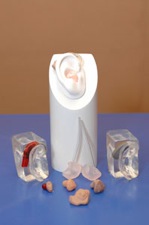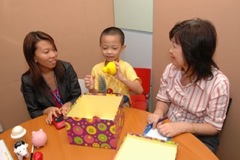The treatment options for Hearing Loss are as follows:
Cochlear Implant (CI)
Before a CI is considered, a series of tests such as an ear examination, hearing evaluation, radiologic (X-ray, MRI) examination, and AVT are necessary.
CI surgery is performed by the otolaryngologist (ENT specialists) under general anaesthesia and lasts from two to three hours. An incision is made just behind the ear to access the mastoid cavity that leads to the middle and inner ears. An X-ray is taken after surgery to confirm the position of the implant. Generally, the patient stays for one or two days after the surgery.
Cochlear Implant Investigations and Therapy
- MAPping
- Neural Response Telemetry (NRT)
- Auditory Performance Evaluation (APE)
- Auditory Verbal Therapy (AVT)
In order to be accepted as a candidate for a cochlear implant, the family is required to attend recommended assessments before the final evaluation can be made. They must also be committed to the clinic's approach. All implantees must undergo regular post-operative assessments.
About one month after surgery, the cochlear implant team will ‘switch on’ the implant. They will teach the parents how to look after the system. The patient will probably be asked to return for a few visits for regular checkups, and readjustments of the speech processor are needed.
Cochlear implants do not restore normal hearing and the benefits vary from one individual to another. There are many factors that contribute to the degree of benefit a user receives from a cochlear implant, including:
- The period/amount of time the patient had been deaf.
- The number of surviving auditory nerve fibers.
- The patient's and family's motivation to learn to hear and speak.

Hearing Aids
Digital, Programmable, and multi-channel Behind-The-Ear (BTE) hearing aids of all styles are available in the market. These aids are suitable for all types of hearing losses, that is, from mild to profound. There are also different types and models of custom hearing instruments, such as Completely-In-The-Canal (CIC), In-The-Canal (ITC), as well as In-The-Ear (ITE). All are worn in the ear to take advantage of the natural hearing process. They are inconspicuous and represent the "elegant" cosmetic solution.


















